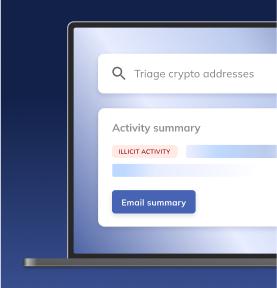*This article has been automatically translated. Please refer to the original article for accurate content.
New operational framework to rapidly transition open cases to on-site response and initial investigation: Expanding DEA and NPCC cryptocurrency prioritization systems with Chainalysis Rapid
The problem is clear: there is a lot of knowledge about cryptocurrencies, but not enough expertise.
Caseloads pile up, evidence becomes stale, and investigators are hesitant due to a lack of resources.
In a recent webinar, the U.S. Drug Enforcement Administration (DEA) and the U.K. National Police Chiefs' Council (NPCC) explained how Chainalysis Rapid is solving these challenges by eliminating bottlenecks, empowering less experienced investigators, and enabling faster response to critical and challenging cases.
On-the-ground impact: real-time decision making
Chad Martin (DEA Task Force Officer):
"While executing search warrants in the field, we often find stacks of documents with cryptocurrency addresses on them. Now we can quickly scan them on-site and make an initial decision on whether or not it's a significant case."
He also talks about how Rapid has changed the way past projects are handled.
"By simply reviewing past investigative reports and entering an address into Rapid, I can instantly see balances, recent transactions, and even links to darknet markets and sanctions targets. Information that I previously didn't have the means or time to investigate in detail can now be accessed instantly with Rapid."
Eliminating bottlenecks: Expanding capacity
At the NPCC, the challenge was the scale of the investigative system. With only a limited number of investigators able to use advanced tools, cases were backed up and responses were slow. Andrew Pester, a cryptocurrency investigator at the NPCC, explains the changes:
"Rapid has made it easier to respond by reducing initial inquiries. Rapid has the attribution, tags, risk categories, and linking to crimes that open source tools don't provide. That's information you can't get anywhere else."
Beyond cybercrime: a standard tool for all agencies
Rapid is increasingly being used in fraud, financial crime and tax investigations, as well as cybercrime and drug-related cases, to quickly triage cryptocurrency-related leads and identify high-risk activity.
When cryptocurrency is involved, Rapid enables investigative teams to take action without waiting for experts.
Detective Inspector Ian Osborne, from the NPCC Cryptocurrency and Dark Web Team, said:
"Rapid's triage capabilities are part of my essential cryptocurrency investigative toolkit. They're essential for getting my work done."
Early adoption: Lowering barriers and building confidence
New investigators often hesitate to act when faced with evidence of cryptocurrency, and Andrew Pester of the NPCC explains why:
"In investigations involving cryptocurrencies, previous experience alone is not enough to build confidence in how to respond, and initial decisions tend to take time. However, Rapid is easy to use, and even first-time investigators can use it right away. This gives them confidence."
DEA's Chad Martin states:
"Just like scanning a QR code on a menu at a restaurant, you can scan the QR code of your Bitcoin address on-site and the information you need will instantly appear."
As you continue to search, you will gain confidence and naturally learn to judge the importance of cryptocurrencies and make initial decisions.
Key Points: Why Choose Rapid?
- On-site support: Instant search for cryptocurrency addresses and assessment of their importance
- Reducing backlog of investigation cases: Reducing the burden on experts by selecting routine cases
- Easy to use for everyone: minimal training required, easy-to-understand results
- Trusted intelligence: relevant information and risk analysis not available in block explorers
- Can be used across government agencies: Introduced by a variety of agencies, including cybercrime, drug enforcement, financial and tax authorities
Crypto crime doesn't stop. With Rapid, the investigations don't stop either.
Government agencies that have adopted Chainalysis' cryptocurrency investigative package may be eligible for Rapid usage.
To get started with Rapid or to learn more, contact your Chainalysis representative.
Log in to Rapid here
If you have any questions or would like a demo, please contact us here .
For those just starting out in blockchain investigations, please also refer to our guide to cryptocurrency field investigations .
Crypto Clues 101: Triage Essentials for Government Investigators
Hear more stories from the DEA and NPCC
Watch the replay
This website contains links to third-party sites that are not under the control of Chainalysis, Inc. or its affiliates (collectively “Chainalysis”). Access to such information does not imply association with, endorsement of, approval of, or recommendation by Chainalysis of the site or its operators, and Chainalysis is not responsible for the products, services, or other content hosted therein.
This material is for informational purposes only, and is not intended to provide legal, tax, financial, or investment advice. Recipients should consult their own advisors before making these types of decisions. Chainalysis has no responsibility or liability for any decision made or any other acts or omissions in connection with Recipient's use of this material.
The post Chainalysis Rapid × DEA・NPCC Cryptocurrency Investigations: A Field Case Study: The Latest Operation of AI Rapid Risk Assessment appeared first on Chainalysis .







